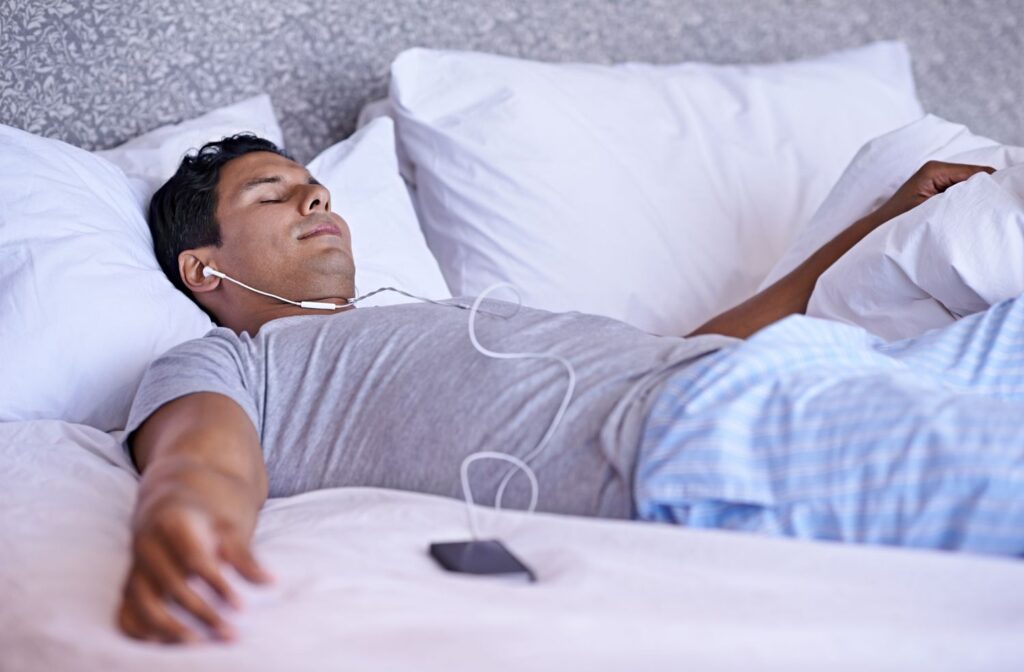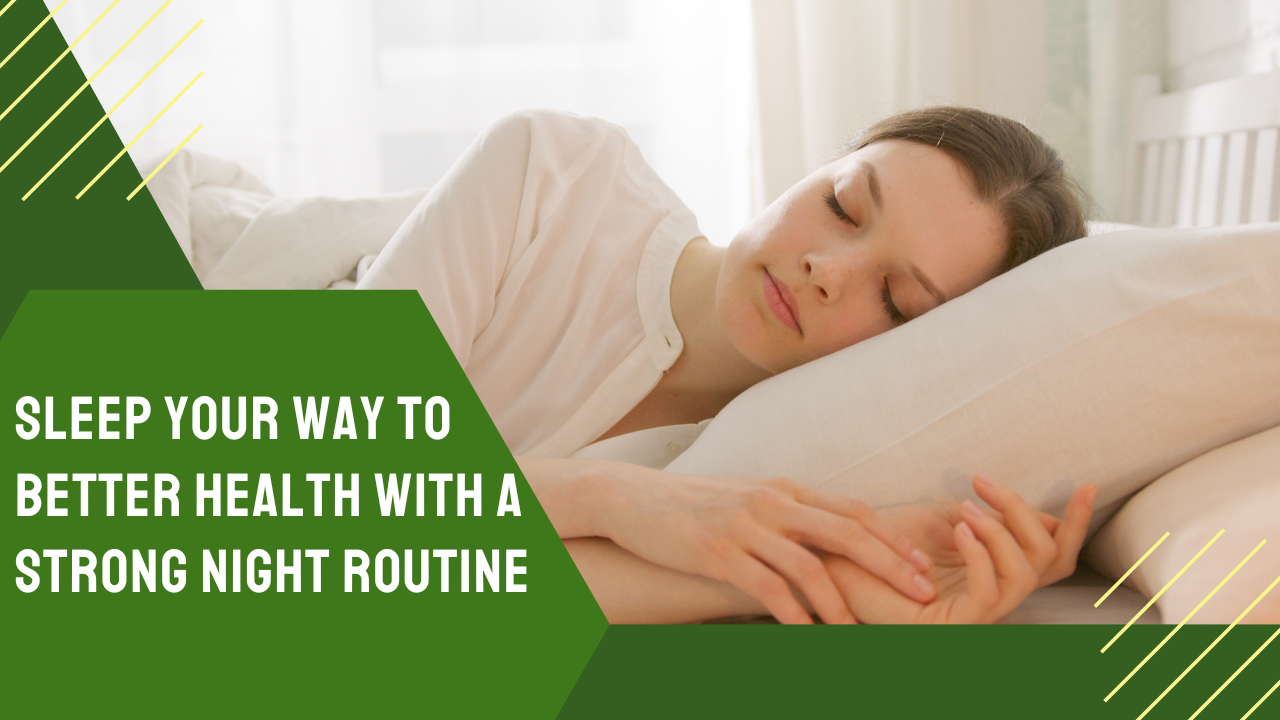In our hectic modern lives filled with work pressures, personal responsibilities, and constant digital noise, sleep is often neglected. Many people push rest aside to keep up with their busy schedules, unaware of how vital it is to overall well-being.
However, getting enough quality sleep is one of the most effective ways to enhance your physical and mental health. A restful night supports your immune system, sharpens your focus, and helps regulate mood and energy levels. It’s a natural remedy that the body depends on to restore and recharge each day.
To truly benefit from sleep, it’s essential to build a steady and mindful night time routine. Creating calming habits before bed—like disconnecting from screens, lowering stress, and sticking to a regular sleep schedule—can make a huge difference. With a little effort and consistency, you can turn your nights into a time of healing and set the foundation for better days.
Understanding the Power of Sleep

Sleep isn’t just a time when the body powers down—it’s an active and essential process that supports nearly every system in your body. While you’re asleep, important functions take place that help restore and maintain your health. Your body moves through different sleep cycles that promote repair, healing, and growth, making rest a key part of your overall wellness.
During the deeper stages of sleep, your muscles recover from daily strain, your brain processes and stores memories, and critical hormones are released to manage appetite, stress, and metabolism. These functions work together to keep you mentally sharp and physically balanced. Simply put, quality sleep is not a luxury—it’s a necessity for maintaining both your mental clarity and physical strength.
The Science Behind Sleep and Health
Before diving into the specifics of a night routine, it’s crucial to understand how sleep affects health:
Cognitive Function: Sleep is essential for maintaining strong brain function. It helps the brain organize and store memories, making it easier to retain and recall information. During sleep, the mind also processes new experiences and prepares for the next day. Adequate rest improves concentration, learning ability, and decision-making, helping you stay alert and focused throughout the day.
Emotional Health: A consistent lack of sleep can seriously affect your mood and emotional balance. Sleep helps the brain manage stress and regulate emotional responses. Without it, you’re more likely to feel anxious, irritable, or overwhelmed. Over time, sleep deprivation increases the risk of developing mental health issues such as anxiety, depression, and mood swings.
Physical Health: Your body uses deep sleep to recover from daily wear and tear. During this phase, it repairs damaged tissues, strengthens muscles, and boosts immune function. Missing out on quality sleep can weaken your immune system, increase inflammation, and raise the risk of serious conditions like heart disease, high blood pressure, and type 2 diabetes.
Weight Management: Sleep plays a critical role in balancing hunger-related hormones. When you don’t get enough rest, levels of ghrelin (which increases hunger) rise, while leptin (which signals fullness) drops. This imbalance often leads to increased appetite, cravings for unhealthy foods, and a greater risk of weight gain and obesity over time.
The Pillars of a Restorative Night Routine
Now that we recognize how essential sleep is for overall health, it’s time to look at how to build a night routine that truly supports your well-being. A well-structured bedtime routine isn’t just about going to bed early—it’s about setting the stage for quality rest that allows your body and mind to recharge fully.
A healthy nighttime routine typically focuses on five key pillars: preparation, timing, relaxation, environment, and consistency. Preparing your body and mind to wind down, going to bed at the same time each night, creating a calm and sleep-friendly space, and practicing relaxing habits all contribute to better sleep. When you follow these steps regularly, your body begins to associate these cues with rest, making it easier to fall asleep and wake up refreshed.
- Preparation: Set the Stage for Sleep

Getting ready for bed doesn’t begin the moment you lie down—it starts much earlier. Preparation is a key part of telling your brain and body that it’s time to slow down and shift into rest mode. The activities you choose in the hour leading up to sleep can strongly influence the quality of your rest.
Simple steps like turning off bright lights, putting away electronic devices, and avoiding heavy meals or caffeine late in the evening can make a big difference. These calming habits signal your body that bedtime is near, helping you ease into sleep more naturally and setting the stage for a peaceful and restorative night. Here are some key preparation strategies:
Avoid Caffeine and Stimulants: Caffeine is a powerful stimulant that can stay in your system for several hours, often up to 6–8 hours after consumption. To support better sleep, it’s best to avoid coffee, energy drinks, black tea, and other sources of caffeine in the afternoon and evening. Even small amounts can delay your ability to fall asleep or reduce the quality of your rest by making it harder to reach deep sleep stages.
Limit Alcohol: Although alcohol might initially help you feel relaxed or sleepy, it actually interferes with the natural sleep cycle. It tends to disrupt the later stages of sleep, especially REM sleep, which is essential for mental and emotional recovery. As a result, you may wake up feeling tired or unrested, even after a full night in bed. Limiting alcohol intake before bedtime can lead to more restful and uninterrupted sleep.
Eat Light, Balanced Meals: Eating a heavy or greasy meal close to bedtime can cause discomfort, indigestion, or acid reflux, all of which may interfere with falling or staying asleep. Ideally, have your dinner 2–3 hours before going to bed and keep it light and nutritious. Opt for meals rich in lean protein, healthy fats, and complex carbohydrates, and avoid high sugar intake that can spike your energy when you need to wind down.
Hydrate Smartly: Staying hydrated throughout the day is important for overall health, but drinking too much water right before bed can lead to frequent bathroom trips during the night. This disrupts your sleep and prevents your body from completing full rest cycles. Try to drink plenty of fluids earlier in the day and taper off in the evening to avoid night time awakenings.
- Timing: Create a Consistent Sleep Schedule
Our bodies function best when they follow a regular rhythm, and this is especially true for sleep. Having a consistent bedtime and wake-up time each day helps keep your internal clock, or circadian rhythm, in balance. This rhythm plays a vital role in determining when you feel alert and when you feel sleepy.
By going to bed and waking up at the same time—even on weekends—you train your body to expect rest at certain hours. Over time, this makes it easier to fall asleep, stay asleep, and wake up feeling refreshed. A stable sleep routine also supports better energy levels, mood, and overall health throughout the day. Here’s how to work with your body’s natural rhythm:
Establish a Bedtime: Experts recommend getting between 7 to 9 hours of sleep each night for optimal health. To support this, choose a bedtime that allows you to meet this goal and stick to it as closely as possible, even on weekends. A consistent bedtime helps your body naturally wind down at the same time each night, making it easier to fall asleep and improving your overall sleep quality over time.
Wake Up at the Same Time Each Day: Waking up at a consistent time every morning is just as important as going to bed at a regular hour. When you maintain a steady wake-up time, your body learns when to feel alert and when to prepare for rest. Avoid sleeping in excessively on weekends, as this can disrupt your internal clock and make it harder to sleep well during the week.
Consider a Sleep Cycle App: Using a sleep tracking app can give you valuable insight into your sleep habits. These apps monitor your movements and sometimes even your breathing patterns to estimate how long you spend in each stage of sleep—light, deep, and REM. This data can help you identify patterns, spot potential issues, and make informed changes to improve the quality of your rest.
- Relaxation: Wind Down to Better Sleep

As the day comes to a close, it’s important to slow your pace and begin shifting into rest mode. Your body and mind need time to transition from the busyness of the day to a more relaxed state. Creating a calm atmosphere in the evening helps prepare you for a restful night’s sleep.
Relaxation isn’t just a luxury—it plays a crucial role in signaling to your body that bedtime is near. Gentle, calming activities like reading a book, taking a warm bath, or practicing deep breathing can help ease stress and quiet the mind. Making time for relaxation each night sets the tone for deeper, more restorative sleep. Here are some effective techniques to promote relaxation:
Practice Mindfulness or Meditation: Mindfulness exercises or guided meditation are effective tools for calming the mind and easing stress as you wind down for the night. By focusing on deep, slow breathing or following a guided meditation session, you can release any lingering tension and mentally prepare for sleep. Using a meditation app can be a great way to structure your relaxation practice, guiding you through various techniques that help lower stress and promote a sense of peace and calm before bed.
Engage in Light Stretching or Yoga: Gentle stretching or a short yoga session before bed can work wonders for releasing physical tension accumulated throughout the day. Simple stretches or yoga poses designed for relaxation help loosen tight muscles, improve blood circulation, and prepare your body for a restful sleep. This calming routine not only helps your muscles unwind but also signals to your brain that it’s time to slow down and get ready for rest.
Read a Book (But Not on Your Phone): Reading can be an excellent way to relax before bed, but it’s important to choose the right material. Opt for something light and soothing, rather than stimulating or intense, to avoid keeping your mind active. It’s best to read a physical book or e-reader that doesn’t emit blue light, as the screen light from phones and tablets can disrupt melatonin production. Melatonin is the hormone responsible for regulating sleep, and exposure to blue light can interfere with its natural release, making it harder to fall asleep.
Try Aromatherapy: Aromatherapy has long been used to promote relaxation and reduce stress. Certain scents, like lavender, chamomile, and sandalwood, are particularly known for their calming effects. You can incorporate these soothing fragrances into your bedtime routine by adding a few drops of essential oils to your pillow or using a diffuser in your bedroom. The gentle aromas will help create a serene atmosphere, promoting relaxation and making it easier to wind down for a peaceful night’s sleep.
- Environment: Create the Perfect Sleep Sanctuary

Your sleep environment has a significant impact on the quality of your rest. A calm, dark, and quiet space is crucial for deep, uninterrupted sleep. Light and noise can easily disrupt your ability to fall asleep or stay in deeper stages of sleep, so creating a peaceful setting is essential. Make sure your bedroom is free of distractions, such as bright lights or loud sounds, and consider using blackout curtains or an eye mask to block light.
Temperature also plays a role in sleep quality. A cool room, typically between 60–67°F (15–19°C), helps lower your body temperature, which signals to your body that it’s time to sleep. Adding soft, comfortable bedding and minimizing electronic devices in the room can further promote a restful atmosphere, ensuring that you get the restorative sleep you need. Here’s how to optimize your sleep environment:
Keep the Room Cool: Maintaining an ideal sleeping temperature between 60-67°F (15-20°C) can significantly enhance your sleep quality. A cool room helps lower your body temperature, which is a natural signal to your brain that it’s time to rest. When your body temperature drops, it encourages deeper, more restful sleep, allowing you to progress through all the necessary sleep cycles for full rejuvenation. If you find it difficult to regulate the room temperature, consider using fans, air conditioning, or lighter bedding to help create a cooler sleep environment.
Reduce Light Exposure: Light exposure can interfere with your body’s natural sleep-wake cycle, so it’s important to reduce it as much as possible when preparing for sleep. Darkness signals your brain to produce melatonin, the hormone that helps regulate sleep. You can achieve a dark environment by using blackout curtains or an eye mask to block out external light. Additionally, dimming the lights during your wind-down routine helps signal to your body that bedtime is approaching and can make it easier to fall asleep.
Minimize Noise: A quiet room is essential for uninterrupted, restorative sleep. Background noise, whether from traffic, household sounds, or external disturbances, can wake you up during the night or prevent you from reaching deeper sleep stages. If you live in a noisy area, using a white noise machine, fan, or even earplugs can help mask these sounds and create a more peaceful sleep environment. This reduces disruptions and helps you stay in a deep, restful sleep without waking up too often.
Invest in a Comfortable Mattress and Pillows: Your mattress and pillows play a critical role in the quality of your sleep. A bed that is too firm or too soft can lead to discomfort and disrupt your ability to maintain a restful posture. Investing in a mattress that provides the right support for your sleeping position is key to avoiding aches and pains. Similarly, choose pillows that support your neck and head alignment to help reduce pressure points and improve comfort throughout the night. A comfortable bed is a foundation for deep, uninterrupted sleep.
- Consistency: Build a Long-Term Habit
After establishing your perfect night routine, consistency is crucial for seeing the benefits. Your body functions best when it follows a predictable rhythm, and sticking to a consistent bedtime routine helps reinforce this pattern. By making relaxation practices and sleep habits part of your nightly ritual, you train your body to recognize when it’s time to wind down and rest.
The more regularly you follow your routine, the more your body and mind will adjust. Over time, this consistency will help you fall asleep faster, sleep more deeply, and wake up feeling refreshed. While occasional variations are fine, the key is to keep your routine as consistent as possible to ensure your body gets into the habit of rest, supporting better overall health and well-being. Here are some tips for consistency:
Avoid Napping Late in the Day: While naps can be a great way to recharge, taking them too late in the afternoon can disrupt your ability to fall asleep at night. Late naps can confuse your internal clock and delay the onset of sleep, making it harder to stick to your bedtime routine. If you need to nap, try to limit it to a brief 20-30 minutes earlier in the day. This will help you stay refreshed without interfering with your nighttime rest.
Be Patient: Adjusting to a new sleep routine takes time, so be patient with your body as it adapts. It can take a few weeks for your internal clock to synchronize with your new habits, so stick with your routine consistently. Over time, you’ll begin to notice improvements in how easily you fall asleep, the quality of your rest, and how refreshed you feel when you wake up.
Listen to Your Body: Your body sends subtle signals when it’s ready for rest, so it’s important to listen to these cues. If you start feeling drowsy or sluggish, that’s a sign that it’s time to wind down and go to bed. Ignoring these signals and staying awake can interfere with your sleep cycle, making it harder to fall asleep when you finally get into bed. Honor your body’s natural rhythms by going to bed when you feel tired, ensuring you get the full rest your body needs.
Additional Tips for Sleep Optimization
While the core routine is essential, here are a few extra tips to enhance your sleep even further:

Exercise During the Day: Regular physical activity is one of the best ways to improve sleep quality, as it helps regulate your sleep-wake cycle and promotes relaxation. Exercise releases endorphins, which reduce stress and anxiety, making it easier to fall asleep at night. However, timing is important—avoid vigorous exercise too close to bedtime, as it can raise your heart rate and energize your body, making it harder to wind down and get restful sleep. Aim to finish any intense exercise at least 3 hours before you plan to go to bed.
Limit Screen Time: Exposure to blue light from screens can interfere with melatonin production, the hormone that regulates sleep. The light emitted from phones, tablets, computers, and TVs can trick your brain into thinking it’s still daytime, making it harder to fall asleep. To promote better sleep, try to limit screen time at least an hour before bed. Instead of using electronic devices, consider engaging in relaxing activities like reading, journaling, or meditating to help signal to your body that it’s time to wind down.
Use a Sleep Journal: A sleep journal is a helpful tool for tracking your sleep patterns and habits. By noting when you go to bed, wake up, and how you feel in the morning, you can identify any trends or issues that may be affecting your sleep quality. This could include factors like bedtime routines, stress levels, or environmental influences. Once you recognize patterns, you can make targeted adjustments to your routine, improving your overall sleep health and helping you establish better habits for restful nights.
Consider Sleep Supplements (With Caution): While natural sleep strategies should always be the first priority, some individuals find that certain supplements can help them fall asleep more easily. Melatonin, magnesium, and valerian root are commonly used to support relaxation and promote better sleep. However, it’s essential to approach sleep supplements with caution and consult with a healthcare provider before incorporating them into your routine. Your healthcare provider can help you determine the right supplement and dosage, ensuring it complements your overall sleep strategy safely.
Conclusion
In conclusion, sleep is more than just a nightly escape from our busy lives; it’s a cornerstone of good health. Developing a night routine that prioritizes relaxation, consistency, and the right environment can be a game-changer for both physical and mental well-being. With the right practices, you can transform your sleep from a passive activity into a powerful tool for healing and rejuvenation.
The benefits of good sleep extend far beyond just feeling rested. A solid night’s sleep enhances cognitive function, boosts your immune system, and even supports emotional balance. By focusing on your nightly habits, you can optimize your sleep cycle, helping your body and mind recover and thrive.
Ultimately, the secret to better health is simple: make sleep a priority. Embrace the power of a well-structured night routine, and watch as it positively impacts every aspect of your life. You can truly sleep your way to better health.
FAQs
- How many hours of sleep do I need each night for optimal health?
Most adults need between 7 to 9 hours of sleep each night to function at their best. However, individual needs can vary depending on factors such as age, lifestyle, and overall health. Some people may feel well-rested with just 6 hours, while others may need closer to 10 hours. Pay attention to how your body feels and adjust accordingly to find the amount of sleep that works best for you. - What are some natural ways to fall asleep faster ?
To fall asleep faster, focus on creating a relaxing bedtime routine. Techniques like meditation, deep breathing exercises, or light stretching can help calm your mind and body. Avoid caffeine and large meals before bed, and limit screen time as blue light can interfere with melatonin production. Creating a comfortable sleep environment—cool, dark, and quiet—can also improve your chances of falling asleep quickly. - Can a night routine help if I already suffer from insomnia ?
Yes! Establishing a consistent night routine is one of the most effective ways to combat insomnia. Creating a relaxing pre-sleep ritual, sticking to a regular bedtime, and ensuring a comfortable sleep environment can help retrain your body to sleep better. However, if insomnia persists, it’s important to consult with a healthcare provider to rule out underlying medical issues. - How do I know if my sleep quality is good ?
Good sleep quality is about more than just how long you sleep. If you wake up feeling rested and refreshed, have consistent energy throughout the day, and don’t experience frequent wake-ups during the night, then your sleep quality is likely healthy. Tracking your sleep cycles with a fitness tracker or sleep app can also help you monitor your sleep stages and understand if you’re getting enough restorative deep sleep and REM sleep. - What should I do if I can’t sleep even after following a night routine ?
If you’ve established a consistent night routine but still struggle to fall asleep, it may be time to assess your overall health or lifestyle. Stress, anxiety, poor diet, or even certain medications can impact sleep. Try including relaxation techniques during the day to manage stress, avoid stimulants like caffeine or nicotine, and ensure you’re staying active. If the problem persists, consider consulting with a healthcare provider or sleep specialist for further evaluation.


